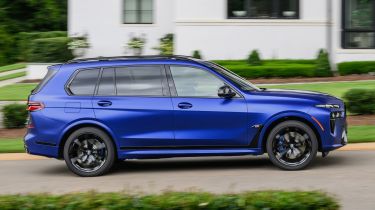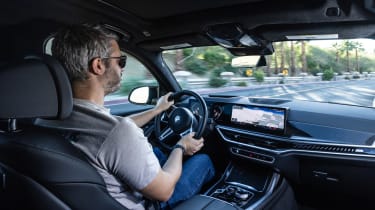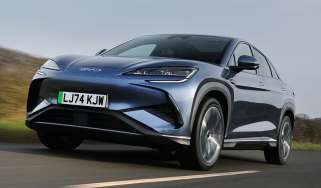BMW X7 SUV - MPG, running costs & CO2
More efficient than many combustion rivals, but a plug-in hybrid is sorely needed
Over the years, BMW has developed an impressive knack for keeping fuel consumption and emissions down, even for its larger models. Its engines are some of the best on the road, using advanced turbocharging to use as little fuel as possible.
All X7 variants cost more than £500 a year to tax, which includes a surcharge in years two to six because the car costs more than £40,000 to buy. After that, road tax will cost the standard rate annually.
BMW X7 MPG & CO2
There are three engines available for the X7: one diesel and two petrols. The entry-level petrol and diesel models are both six-cylinder units, while the range-topping M60i gets a muscular V8 engine. All come with four-wheel drive and an eight-speed automatic gearbox – a manual option won’t be offered given the X7's luxury status and autonomous driving features.
The sole diesel in the range is the 3.0-litre mild-hybrid found in the xDrive40d and is familiar from the BMW X5 and BMW 5 Series. In the X7, it can return up to 36.2mpg thanks to 48-volt mild-hybrid assistance, while emitting over 200g/km of CO2. Unfortunately, like every X7, this places the car into the top BiK banding for company-car tax.
More reviews
In-depth reviews
If you’re keen to pay a little less company car tax, the BMW X5 xDrive45e is an impressive plug-in hybrid that offers a large electric range and low CO2 emissions without scrimping on interior quality – although, this doesn't have seven seats like the larger X7.
Costing only slightly more than the xDrive40d, the petrol xDrive40i can return up to 25.7mpg and emits 250g/km of CO2, making it cheaper to run than the Range Rover’s more-powerful 5.0-litre supercharged V8.
As the most potent X7 in the range, the M60i is also the most costly to run, with its 4.4-litre V8 petrol engine capable of up to 22.1mpg under WLTP economy testing. That’s a figure that falls into the mid-teens every time you accelerate with any enthusiasm. The CO2 emissions are equally high, standing at 290g/km. As you might expect, the M50i is firmly in the top BiK band as a result.
Where the BMW X7 range currently falls down is its lack of an electrified version. While one hasn’t been confirmed yet, a plug-in hybrid could arrive in due course to take on the Range Rover P440e and P500e; these both utilise a 3.0-litre petrol engine, electric motors and a battery pack, for a 68-mile EV range.
Insurance groups
All versions of the BMW X7 will be expensive to insure, with its price and specification earning a group 50 ranking. By comparison, the entry-level Range Rover sits in group 45 out of 50.
Warranty
The BMW warranty lasts for the same three years as most rivals, however, BMW is slightly more generous because mileage isn't capped.
Servicing
To save yourself from large bills when the BMW X7 requires maintenance, the brand offers fixed-price servicing plans that can spread the cost over monthly payments.














